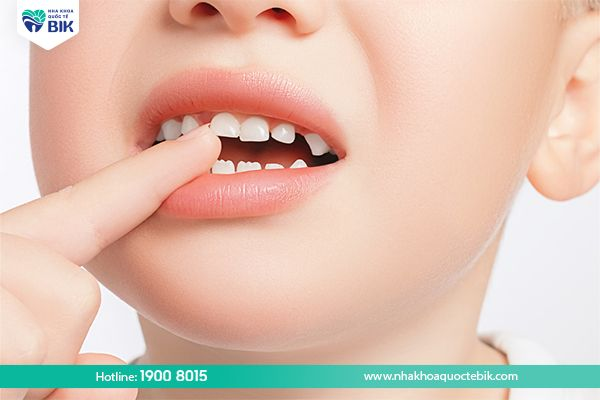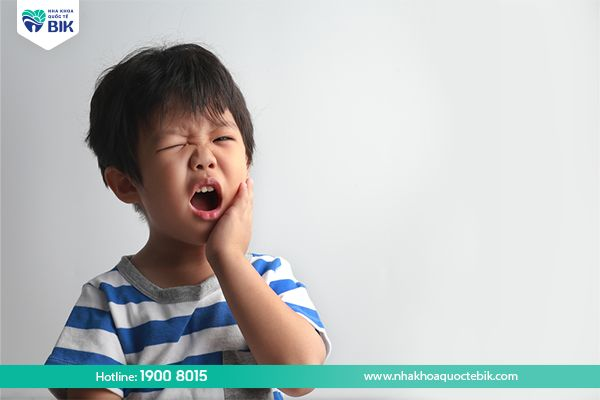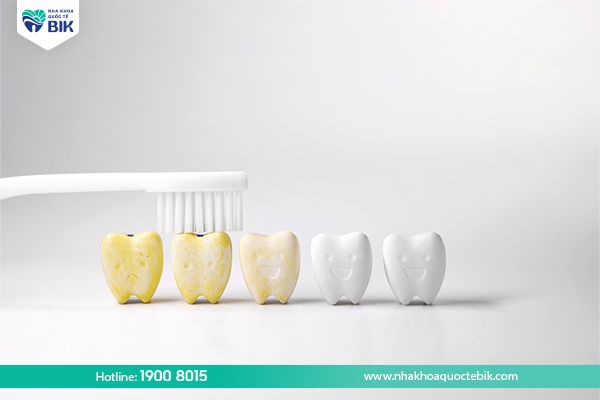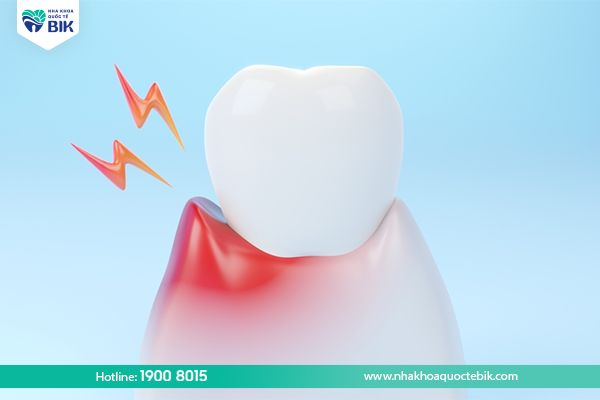Baby teeth can be worn down for many different reasons, and the most obvious symptom is pain when chewing, which directly affects the child’s health due to lack of nutrients. Therefore, as soon as it is discovered, parents should not be subjective but need to apply some ways to handle when their child’s baby teeth are worn down to avoid complications later when permanent teeth grow.
1. Causes of baby teeth wear down
Baby teeth begin to grow when children start to enter the age of 6, then they will gradually complete in the following years and help the child’s eating and pronunciation process easier and more convenient. In addition, baby teeth also play a role in shaping the child’s jaw, holding the position for permanent teeth to grow properly and sufficiently. Therefore, even though baby teeth will fall out and be replaced by permanent teeth, parents still need to pay attention to taking good care of their children’s oral health.
There are many reasons why baby teeth wear down and the outer enamel layer gradually disappears, increasing the risk of tooth decay. The common cause of tooth decay is improper oral hygiene and parents not paying attention to supervising their children when brushing their teeth.
Not only that, letting children consume foods with high acid content will also cause tooth enamel to wear down. Tooth erosion can also be caused by a lack of fluoride, a mineral that helps strengthen tooth enamel, preventing tooth enamel erosion and tooth decay.

2. Signs of tooth erosion
Teeth erosion often occurs over a long period of time and is difficult to detect in the early stages. Usually, when parents realize it, the enamel has been eroded quite a bit. Parents can consider the following signs of tooth erosion in children:
2.1. Toothache
The enamel layer is eroded, causing the tooth to lose its protective layer against external influences, which even affects the surrounding gums, leading to toothache.

2.2. Discolored teeth
The worn enamel will reveal a dull white strip located on the worn surface of the baby tooth close to the gum line. When the baby tooth wear is more severe, this white strip will gradually turn yellow or even brown or black. This is a sign that baby tooth wear is progressing to tooth decay.

2.3. Teeth become sensitive
Enamel wear on baby teeth causes teeth to lose their outer protective layer, so they will definitely become more sensitive to external influences. The most obvious symptom is that children often feel pain and discomfort when eating hot or cold foods.
2.4. Swollen gums
In addition to the obvious wear of baby teeth, the gums will also be affected to some extent, becoming swollen or even bleeding.

3. How does worn baby teeth affect you?
Experts say that worn baby teeth will negatively affect the growth and development of permanent teeth later on. If baby teeth are too damaged, it will affect the pulp and may even require early tooth extraction.
However, the most immediate and obvious effect when children have worn baby teeth is the feeling of pain and sensitivity when chewing. This makes children lose their appetite and affects their overall health when they do not receive adequate nutrition. Therefore, parents should find a way to handle it promptly when their children show signs of worn baby teeth.
4. How to handle when children’s baby teeth are worn
How to handle worn baby teeth will depend on the level of erosion:
4.1. For cases of mild tooth erosion
For cases where baby teeth are only slightly eroded and detected early, parents can apply some of the following methods: use toothpaste containing fluoride, remineralize enamel and dentin, silver diamine fluoride, use mouthwash, etc.
4.2. For severe tooth wear, tooth decay
If the tooth enamel wear is more severe and the parents have just discovered it, the tooth has completely lost its enamel layer, and there is tooth decay, the doctor will remove the decay and then perform tooth filling or porcelain restoration to restore aesthetics.
The material used to fill teeth is usually mercury, silver, metal or composite resin commonly used in dentistry, has high durability and is completely harmless to the body.
5. How to prevent baby teeth from wearing down
To restore and prevent baby tooth enamel from wearing down, parents can apply the following measures:
- Do not let your child suck on a bottle while sleeping, and take the nipple out when the child is fast asleep.
- Regularly clean the child’s mouth with water, a warm towel, and specialized gauze.
- Regularly clean the pacifier.
- Limit children from drinking sugary soft drinks, canned fruits with high sugar and acid content.
- Form the habit of drinking water regularly, especially after eating or after drinking milk.
- Children from 18 months old should learn how to brush their teeth with a soft-bristled toothbrush.
- Brush your teeth at least twice a day, combined with using dental floss to clean between teeth.
- Take your child for regular check-ups at least twice a year to keep up with detect and treat dental problems if any.
So when detecting signs of worn baby tooth enamel, parents can apply some of the ways to deal with worn baby teeth that BIK International Dental Clinic has suggested above. To ensure that children’s oral health is not affected later in life, parents should form the habit of proper oral care and hygiene for their children from an early age.


















